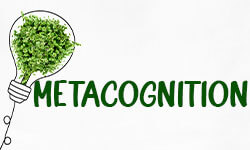
Word definitions are a common component of the English language that helps people to comprehend words. These definitions serve as mediators between many cultures, languages, and perspectives and promote the understanding and communication between people speaking or learning a language. This article will take a look into the background of the word “metacognition” and examine its spelling and meaning.
Definition of “metacognition”
Metacognition refers to the awareness and understanding one has of one’s thought processes. It’s essentially thinking about thinking. This concept includes recognising how one learns, processes information, and solves problems, as well as being able to monitor, evaluate, and adjust those processes as needed.
Use of “metacognition” in a sentence
In the English language, “metacognition” operates grammatically as a noun. This term is used to describe awareness and comprehension of one’s own thought process. The three main metacognitive skills involve planning, monitoring, and evaluating your own thinking and learning process.
How to spell “metacognition” correctly
The word “metacognition” is often misspelled as “metacogniton,” “metacognision,” and “metacoginition.” This can occur due to typographical errors, misunderstanding of the word’s correct spelling, or unfamiliarity with its correct structure. If you are uncertain how to spell this word correctly, you need to track down its roots.
The root words come from the prefix “meta-” and the word “cognition.” The prefix is of Greek origin, “μετά,” meaning “after” or “beyond.” Whereas, “cognition” comes from the Latin “cognito,” which means “knowing” or “acquiring knowing.”
This aptly describes the concept of thinking about one’s thinking processes and being aware of one’s cognitive strategies and abilities. The use of “metacognition” in psychological and educational contexts is relatively recent, gaining prominence in the latter half of the 20th century.
Correct spelling
metacognition
Wrong spelling
metacogniton
metacognision
metacoginition
Synonyms for “metacognition”
If you feel insecure about the correct meaning of “metacognition” in sentences, it may be beneficial to use synonyms for it. This way you can understand it thoroughly and use the term correctly.
Furthermore, you can avoid repetition and redundancy in your academic work. The table below illustrates three alternative words for “metacognition” and respective examples of how to use them judiciously in sentences.
| Synonyms | Examples |
| Self-awareness | Her methods were ineffective, so she used metacognition to improve her strategy. |
| Her methods were ineffective, so she used self-awareness to improve her strategy. | |
| Introspection | Through metacognition, he discovered his procrastination stemmed from fear of failure. |
| Through introspection, he discovered his procrastination stemmed from fear of failure. | |
| Reflective thinking | She used metacognition to evaluate her project, identifying areas for improvement. |
| She used reflective thinking to evaluate her project, identifying areas for improvement. |
FAQs
In simple words, metacognition is thinking about your thinking. It’s when you pay attention to how you learn and solve problems, like noticing if a study method is working for you or figuring out why you got an answer wrong. It helps you understand and control your learning process.
An antonym of metacognition, which involves a high level of awareness and control over one’s thought processes, would be a concept indicating a lack of awareness or understanding of one’s cognitive processes. This could be incognizance, non-reflectiveness, or obliviousness.
Imagine you’re studying for a difficult exam. While you’re studying, you notice that you’re struggling to understand a particular concept. Instead of simply continuing to read the material without reflection, you pause and think about your own thinking process. Here, planning how to approach a learning task is metacognition.
They are planning, monitoring, and evaluating.
- Planning: Before engaging in a task, planning involves setting goals, choosing strategies that might be effective for the task, and allocating resources (such as time and attention) appropriately. It’s about foreseeing the steps needed to achieve a learning or problem-solving goal.
- Monitoring: While engaged in a task, monitoring is the ongoing process of checking one’s understanding and performance. It involves being aware of what one is learning, recognising if one is on the right track or if misunderstandings are occurring, and knowing when it might be necessary to adjust strategies in real-time.
- Evaluating: After completing a task, evaluating involves reflecting on the work that was done and the outcomes achieved. This includes assessing the effectiveness of the strategies used, determining whether the goals were met, and considering what could be improved for future tasks.
- ✓ 3D live preview of your individual configuration
- ✓ Free express delivery for every single purchase
- ✓ Top-notch bindings with customised embossing

